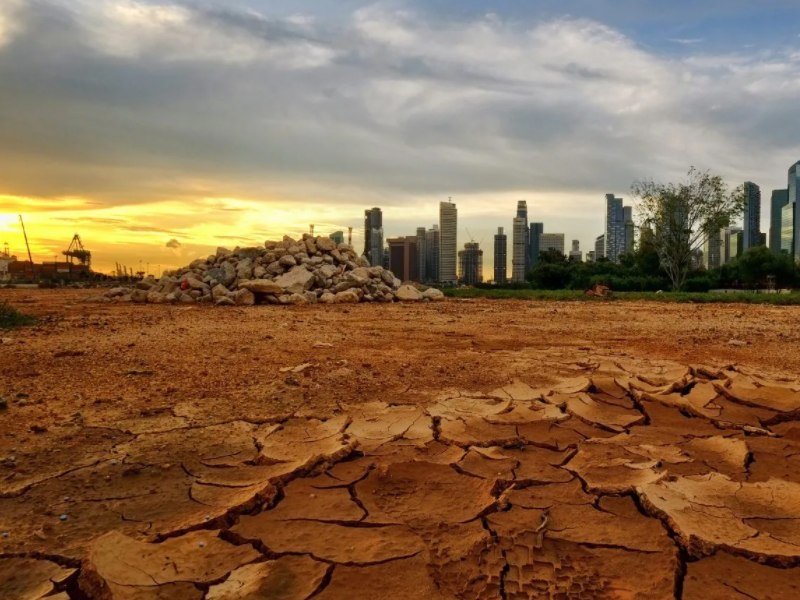June 13, 2023
Global Climate Change, How To Deal With Is The Responsibility Of Every Enterprise!
Global Climate Change, How To Deal With Is The Responsibility Of Every Enterprise!


Causes Of Climate Change
The cause of climate change may be natural internal processes, external forcings, or continuous man-made changes in the composition of the atmosphere and land use. There are both natural factors and human factors. Among the human factors, it is mainly caused by human activities since the industrial revolution, especially the economic activities in the industrialization process of developed countries. Greenhouse gases emitted by human activities such as fossil fuel combustion, deforestation and land use change have led to a substantial increase in atmospheric greenhouse gas concentration and the enhancement of greenhouse effect, thus causing global warming. According to the Oak Ridge Laboratory research report, since 1750, the world has emitted more than 1 trillion tons of carbon dioxide, of which developed countries account for about 80%. What are the effects of climate change? Climate change has led to more severe weather events, accelerated melting of glaciers and snow, unbalanced distribution of water resources and threats to biodiversity.
Climate change is also causing sea levels to rise, making coastal areas more vulnerable to natural disasters such as floods and storms, and threatening small island states and low-lying coastal areas with inundation. Climate change will adversely affect economic and social activities such as agriculture, forestry, animal husbandry and fishing, increase the spread of diseases, and threaten social and economic development and people’s health. According to the United Nations Intergovernmental Panel on Climate Change, if the temperature rise exceeds 2.5 ° C, all regions of the world are likely to suffer adverse effects, with developing countries suffering particularly severe losses. If the temperature rises by 4 ° C, it may bring irreversible damage to the global ecosystem and cause significant losses to the global economy. According to the National Assessment Report on Climate Change released by China in 2006, the impacts of climate change on China are mainly concentrated in agriculture, water resources, natural ecosystems and coastal zones. It may lead to increased instability in agricultural production, increased flooding disasters in the south, increased contradiction between supply and demand of water resources in the north, degradation of ecosystems such as forests and grasslands, frequent biological disasters, sharp decline in biodiversity, frequent typhoons and storm surges, aggravated disasters in coastal areas, and affected the construction and operation safety of relevant major projects.
The consensus of global scientists is that more than 90% of the responsibility for climate change is likely to be human, and the decisions and choices human beings make today will affect the direction of climate change. Today, the Earth is hotter than it has been for 2,000 years. If the situation continues to worsen, by the end of this century, the Earth’s temperature will climb to the highest in two million years.
Over the past 100 years, human beings have been relying on fossil fuels such as oil and coal to provide energy for production and life, and the greenhouse gases such as carbon dioxide emitted by the combustion of these fossil fuels are the main reason for the enhancement of the greenhouse effect and thus global climate change. About a fifth of greenhouse gases are emitted by destroying forests, reducing their ability to absorb carbon dioxide. In addition, some special industrial processes, agriculture and animal husbandry also contribute a small amount of greenhouse gas emissions.
How do we deal with this
The issue of global climate change has aroused widespread concern in the international community. The international response to climate change has gradually taken shape with the development of the United Nations Framework Treaty on Climate Change. The first World Climate Conference in 1979 called for climate protection; The United Nations Framework Convention on Climate Change (UNFCCC), adopted in 1992, established the principle of “common but differentiated responsibilities” between developed and developing countries. It sets out its framework for action, which seeks to stabilize atmospheric concentrations of greenhouse gases at a level that prevents human activities from having a “negative impact” on the climate system; The Kyoto Protocol (hereinafter referred to as the “Protocol”) adopted in 1997 set the quantified emission reduction targets for developed countries from 2008 to 2012. The Bali Road Map, agreed in December 2007, identified separate negotiations on strengthening the UNFCCC and the implementation of the Protocol, leading to the Conference of the Parties in Copenhagen in December 2009.
The UNFCCC has received ratification, acceptance, support or additions from 185 countries and has successfully held six conferences of the Parties with the participation of all Parties. Although the parties have not yet reached a consensus on the measures to be taken for the comprehensive management of climate change, the concept that global climate change will bring incalculable losses to people, and that climate change will cause human beings to pay a huge price has been widely accepted in the world, and has become a global environmental issue that has been widely concerned and studied.
As a responsible enterprise, CHAMB Energy has been strictly required to protect the environment is our corporate mission, our company has developed a lot of environmental protection policies on mining, which has been strongly supported by the company’s shareholders meeting. We plan to implement the renewable resources cultivation plan for all mine managers managed by our company before 2030. Our products come from nature and we must give back to nature. Every year, the company will hold tree planting, forest waste cleaning and other activities to ensure that our plan can be perfectly executed.
STAY IN THE LOOP
We look forward to being able to establish contact with you, if you have any questions about minerals need to consult, you can also contact us, our professional technical engineers will contact you within 24 hours!


